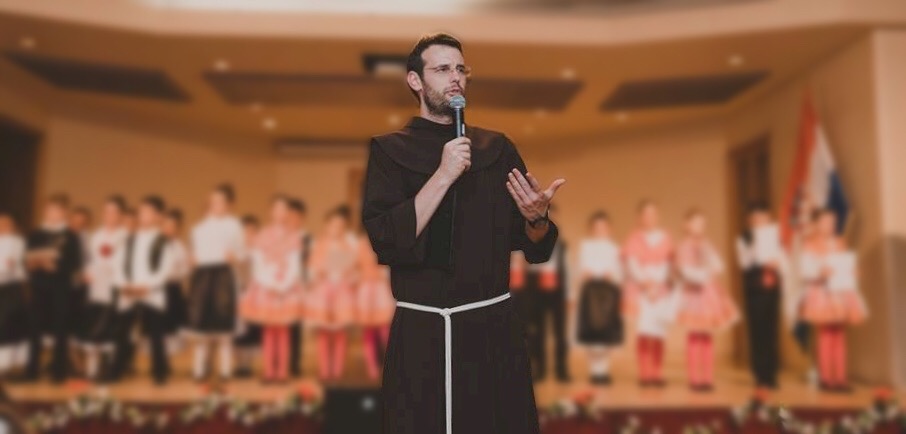Those priests—all 66 of them—were murdered by communists in Bosnia and Herzegovina during World War II, said Željko Barbarić, O.F.M., GRE ’19, a young Catholic priest from the Franciscan community. “Anyone who was wearing a habit at the time—a Franciscan robe—he was killed or persecuted,” Father Barbarić said. “Communism was against religion, in any sense. Communism itself was a religion.” It happened in the 1940s, long before Father Barbarić was born. But he hasn’t forgotten the massacre of his Franciscan forefathers. It’s part of the reason why he’s currently studying pastoral counseling and spiritual care in Fordham’s Graduate School of Religion and Religious Education.
“I didn’t realize how connected mental health and my vocation are until I came here,” he said.
Father Barbarić was born in Bosnia and Herzegovina, a country bordered by Croatia, Serbia, and Montenegro and home to a multiethnic population. In the early ’90s, war broke out among the ethnic groups fighting for sovereignty. Father Barbarić calls it the War for Independence; America knows it as the Bosnian War. Given the wars that have ravaged Eastern Europe and the Balkans, he said, mental health services are vital back home.
Fifteen miles away from his house in Bosnia and Herzegovina was a war zone. He remembers uniformed men bearing weapons; the sound of sirens and shootings; the death of a cousin, who fought in the war. Every so often, he heard the explosions of bombs from his basement bedroom.
At age 14, Father Barbarić left home and joined a minor seminary. At first glance, it seems surprising. He was not raised in a household where prayers and talk of God abounded. Growing up, Father Barbarić had mulled over a few métiers, including serving in the police force and fighting among the soldiers. Yet he found his calling in God.
“It was just something that you know,” he said.
Priest vs. Psychologist
Over the next two decades, Father Barbarić has learned what it means to be a Franciscan priest. He’s lived in monasteries in Croatia and Bosnia and Herzegovina, completed a five-year degree program in theology and philosophy in Croatia, became ordained as a priest, and served in two different parishes in Bosnia and Herzegovina. He’s dealt with delicate situations, like delivering a homily at the funeral of a young boy killed in a car accident. Strangers have laid bare the most intimate details of their life with Father Barbarić—their marital issues, their struggles with psychiatric disorders, their mishaps with neighbors. And as time passed, he came to a realization:
“Counseling is something that happens almost on a daily basis when you’re a priest,” Father Barbarić said. “A background in psychology can be very, very useful.”
In 2016, he moved to the U.S. and enrolled in the GRE’s pastoral counseling and spiritual care program. His coursework confirmed his suspicions that counseling training would be helpful in his role as a priest.
“People will come to us, explicitly asking for advice. ‘What am I supposed to do?’” he imitated. “And that’s a big temptation—to immediately tell people what to do, especially in a confessional setting.”
But his professors have taught him how to truly listen. Instead of instantly jumping in with an answer, Father Barbarić waits. And when a person struggles to finish his or her sentence, he is trying to let them find their own words. This skill—seemingly obvious, but difficult in practice—is especially important when speaking with people who struggle with their mental health.
“They can see things in a distorted way, and I have to really hear them to understand,” he said.
And he’s also learned that he doesn’t have to save everyone. Sometimes, sitting beside them and lending an empathetic ear is enough.
Father Barbarić is currently a priest at the Sts. Cyril and Methodius Croatian Parish, located in midtown Manhattan. Two months ago, Father Barbarić began an internship where he puts his mental health and spiritual care training into practice. On Mondays and Tuesdays, he counsels patients in a New Jersey psychiatric ward, including suicide survivors, victims of abuse and people with schizophrenia and bipolar disorder.
“Everything you say in this room will stay in this room,” he tells them.
Back to the Balkans
Next spring, Father Barbarić will graduate with his master’s degree in pastoral counseling and spiritual care. He’s also leaving a legacy behind at Fordham.
“Željko has been instrumental in helping to set up the new partnership between GRE and the Catholic University of Croatia,” said Joanna Mercuri, a GRE graduate assistant.
This international agreement allows Fordham and Croatian students and faculty to conduct research and study abroad at both universities, starting this semester. Father Barbarić is the one who connected the president of the Catholic University of Croatia, his old mentor, with Faustino M. Cruz, S.M., GRE dean.
“Through global partnerships like this one,” said Dean Cruz, “GRE is enriched by the diversity of academic, civic, and spiritual perspectives that shape today’s communities of teaching and learning.”
Father Barbarić is unsure about his next steps after graduation. He might help establish a similar program for newly ordained priests or students in training in Bosnia and Herzegovina; he might help revitalize the Franciscan high school in his hometown. But someday, he said, he’ll bring his newfound mental health and spiritual care training back to the Balkans.
“I’m a priest. I’m a Franciscan. That’s already fulfilling,” Father Barbarić said. “But now I’m adding something to it.”

